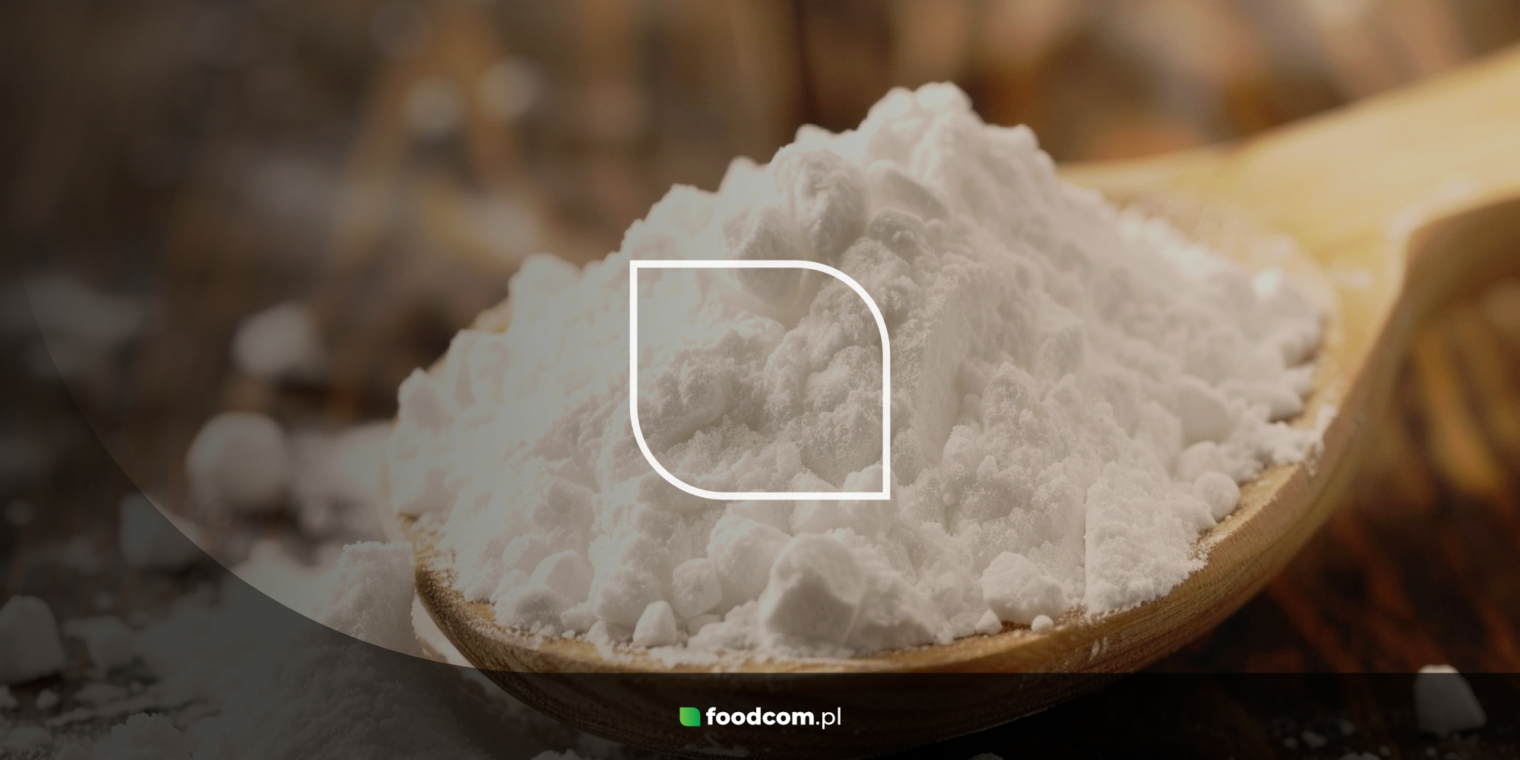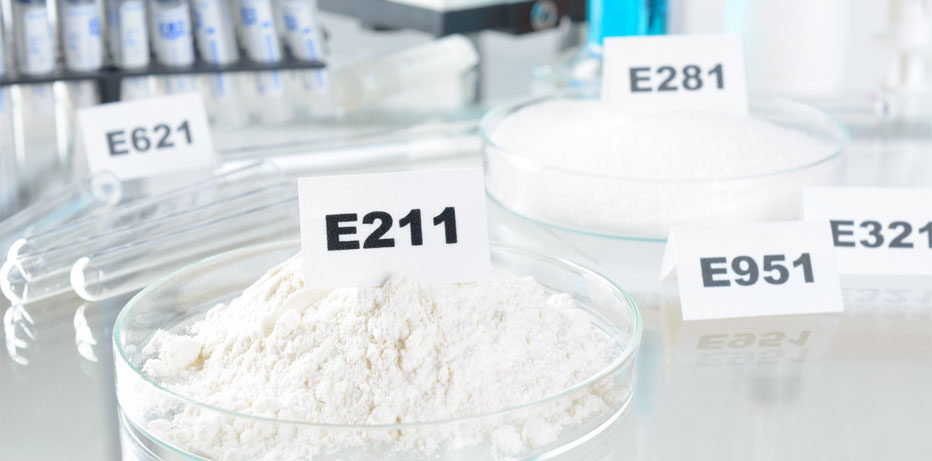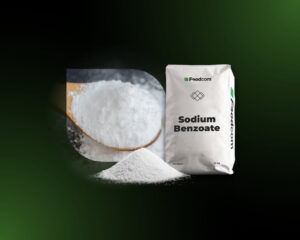- Sodium Benzoate is a sodium salt of benzoic acid.
- It inhibits the growth of yeast, mold and has a bacteriostatic effect.
- Due to its properties, Sodium Benzoate is mostly used as a preservative in food and cosmetics.
What is Sodium Benzoate?
Sodium Benzoate is an organic chemical compound, the sodium salt of benzoic acid. It is obtained by the neutralization of Sodium Hydroxide. It is also worth noting that many foods are natural sources of Sodium Benzoate in the form of benzoate anion. It is found in tomatoes, berries, plums, apples, seafood, and dairy products.
Sodium Benzoate is a white, odorless, crystalline powder. It is highly soluble in water and has hygroscopic properties. Sodium Benzoate inhibits the growth of yeast and mold. It also has a bacteriostatic effect.
It is worth noting that Sodium Benzoate does not provide calories and does not increase blood sugar levels.
Thanks to its properties, Sodium Benzoate is widely used as a preservative, but it is not its only use. Do you want to find out more about the industrial applications of Sodium Benzoate? Then read on!
Sodium Benzoate uses
Sodium Benzoate is very commonly used in the food industry. It is present in many products and serves as a preservative.
It has been shown that Sodium Benzoate can be combined with other preservatives such as sodium nitrite (E250) or Potassium Sorbate (E202). They then have a synergistic antimicrobial effect and a lower dose can be used.
In addition, Sodium Benzoate is also used in the production of cosmetics. It is also a preservative that stops the growth of bacteria, mold and fungi, prevents the spoilage of cosmetics and extends their shelf life.
In the pharmaceutical industry, Sodium Benzoate is used as a preservative in some over-the-counter and prescription drugs, especially syrups. It also makes tablets transparent and smooth, so they disintegrate more quickly after swallowing. In addition, Sodium Benzoate finds its uses in medicine – it has an expectorant and disinfectant effect and is used for inflammation and bronchial dilation, as well as stomatitis of bacterial origin. A combination of Caffeine and Sodium Benzoate has analgesic and antipyretic effects, and is therefore used in painkillers. Sodium Benzoate also prevents corrosion in storage fluids for surgical instruments. Sometimes it is used as an ingredient in disinfectants.
Sodium Benzoate is also used in pyrotechnics. It is involved in the manufacture of fireworks, as a fuel in whistle mix. It can also act as an anticorrosive, is an additive to paints and coatings, an ingredient in adhesives, lubricants, antifreeze, sealants and other car care products.
It can be concluded that Sodium Benzoate is pretty versatile, just like Lactic Acid or Polysorbate 20. If you want to know what these substances have in common, read our comprehensive article.
Sodium Benzoate as food preservative
Sodium Benzoate is a preservative with the symbol E211. It acts by allowing benzoic acid – the active ingredient of which Sodium Benzoate is the precursor – to penetrate the cell structures of microorganisms present in food and prevent them from further development and multiplication. Sodium Benzoate not only prevents spoilage by harmful yeasts, bacteria and molds, but also helps prevent or slow down changes in texture, taste, color and pH.
Sodium Benzoate is most commonly used in foods that naturally have an acidic pH. When the pH is acidic, in the range of 2.5-4.5, it is most efficiently converted to benzoic acid. This means that it can then have the strongest possible preservative properties.
Sodium Benzoate can be found in the following foods and beverages:
- canned fruit and fish,
- sauces,
- sweet fruit drinks,
- salad dressings,
- wines,
- carbonated drinks,
- condiments,
- pickles.
Sodium Benzoate as a food additive is considered safe. However, its concentration should not exceed 0.1%.
Sodium Benzoate in cosmetics
As mentioned above, Sodium Benzoate is commonly used as a preservative in cosmetics. It not only prevents the growth of bacteria, mold and fungi, but also protects the cosmetic from secondary contamination by microorganisms during daily use of the cosmetic, for example, when the product is picked up with a finger. Another important function of Sodium Benzoate in cosmetics is as a fragrance and masking agent.
The use of Sodium Benzoate is especially important for cosmetics that contain water in their composition. It can be found in face and body washes, lotions, creams, cleansing products, hair care products, eye creams, baby creams and oral hygiene products. Sodium Benzoate can also be added to natural cosmetics.
Depending on the type of product, different concentrations of Sodium Benzoate are used. In products that are rinsed with water, it reaches a concentration of 2.5%, in those that are not rinsed – 0.5%. On the other hand, all oral care products may contain 1.7% Sodium Benzoate.
Sodium benzoate in cosmetics is also safe. However, it should not be mixed with Vitamin C, which is contained in various types of skin care products, because such a mixture produces benzene, which is considered a toxic compound.
Why Foodcom?
Our great team of Sales Support will help our Traders conduct the contract and business deals in a smooth and efficient way to ensure the best quality service to all our Business Partners. Our logistics team will take care of transportation and the financial department will be responsible for all matters connected with the financial part of the deal. Do not hesitate! Contact us.









